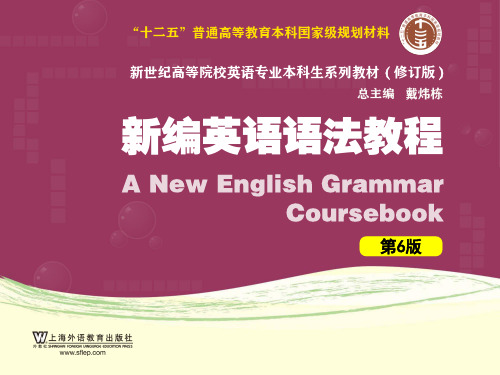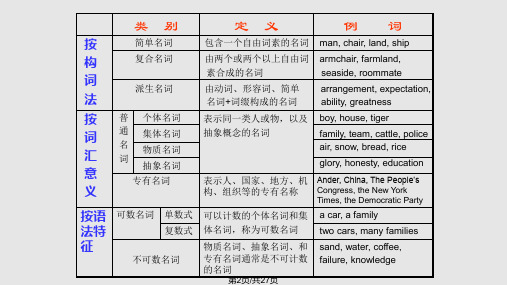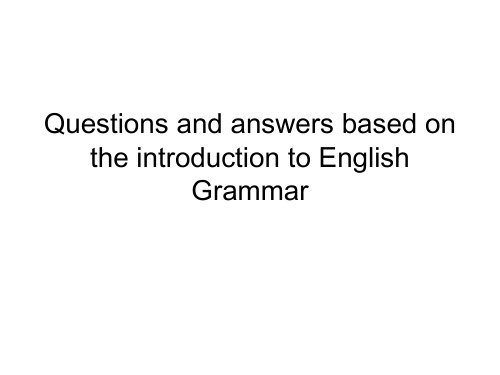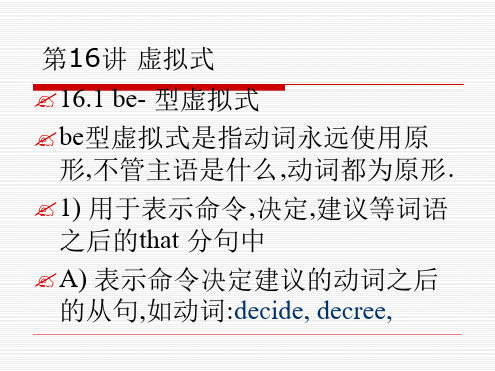新编英语语法教程_复习资料全
新编英语语法教程第11讲

5.我多么希望你也在这里和我们在一起. A: How I wish you were here with us. 6.Jane 告诉我,你明年即将进大学. A: Jane told me you were going into the college. 7.罗马建成非一日之功. A: Rome was not built in a day.
• • • • • • • • • • •
Exercise 11A 1. 滴水穿石。 A: Patience wears out stones. 2. 骄必败。 A:Pride goes before a fall. 3。事实胜于雄辩。 A: Facts speak louder than words. 4。一燕不成夏。 A: One swallow doesn’t make a summer. 5。长江流入东海。 A:Changjiang flows into the East China Sea.
class. • 11. 我们的公司并非总是高额赢利. • A: Our company does not always make high profits.
• • • • •
• • • • • • •
12. 母亲通常不在早晨喝咖啡. A: My Mum usually doesn’t have coffee in the morning. 13. 她几乎从严不在午夜之前就寝. A: She hardly ever goes to bed before mid-night. 14. Arizona州首府凤凰城( Phoenix) 天气很干燥;几 乎不下雨。 A: Phoenix, the captital of Arizona, is dry and it hardly rains. 15. 星期日我父母很少去做礼拜. A: My parents seldom go to church on Sunday. 16. 地球围绕太阳转. A: The Earth moves around the Sun. 17. 印度位于中国迤南. A: India lies to the south o• •
外教社新编英语语法教程(第6版)PPT课件Unit 26

重难点解析
26.2 比较结构
26.3 关于比较结构 用法的补充说明
(3)基本用法三:两个不同主语就不同方面进行比较。 即主语不同,比较项目也不同。
e.g. One is as light as the other is heavy. ——两个物体就轻重作比较。 (一个轻,而另一个重。)
It was by far the worst speech he had ever made. That was much the best meal I have ever tasted.
提示 注 意 very 和 much 修 饰 最 高 级 时 , 位 置 稍 有 不 同 。 如 “They wanted the very best quality.”。
An oxygen atom is about 16 times heavier than a hydrogen atom. (氧原子重量大约是氢原子重量的16倍。/ 氧原子比氢 原子大约重15倍。)
Its profits are rising four times faster than the average company. (其利润正以一般公司4倍的速度快速增长。)
重难点解析
26.2 比较结构
26.3 关于比较结构 用法的补充说明
1 as … as结构
1. 基本模式: as + 形容词或副词原级 + as-分句 否定式: not as / so + 形容词或副词原级 + as-分句
(1)基本用法一:两个不同的主语就同一方面进行比较。 即主语不同,比较项目相同。
Of the two boys John behaves (the) more politely. Oxford is the older university of the two.
新编英语语法教程

附特殊用法: A 表达某种情绪 I happen to drop in on her once and you make such an
issue of it. B 死者言论著作,仍有影响 Darwin believes that natural selection is the chief factor
4 现在进行体的其他用法 A 表示刚过去的动作 You don’t believe it I’m telling the truth. B 婉转的语气 I’m hoping you’ll give us some advice.
11.4 过去进行体的用法 1 表示过去某时正在进行的动作 What were you doing yesterday at seven p.m The students were still laughing when the teacher stepped
B 既定事实 Tomorrow is Sunday.
5 表示过去时间
能用一般现在表示过去的动词有 tell, say, hear, learn, gather 等.
一般用于转述别人不久前对自己说的话,尤其时所说的情 况现在依然存在,
Eg: Alice tells me you’re entering college next year. I hear poor old Mrs Yang has lost her son.
8.滚石不生苔. A: A rolling stone gathers no moss. 9.熟能生巧. A: Practice makes perfect. 10. 谁笑在最后,谁笑得最好.
One who laughs last laughs best.
新编英语语法教程讲

9.
exaggeration
10. measurement 11. purity
12.
persistence
13. extension
14. statement
15.
generosity
第5页/共27页
II. Number forms of nouns
1. Regular and irregular plural a) Regular plural (p.p. 42-44) b) Irregular plural (p.p. 44-45)
类别
定义
例词
按 构 词 法
按 词 汇 意 义
按语 法特 征
简单名词 复合名词
派生名词
普 个体名词 通 集体名词 名 物质名词 词 抽象名词
专有名词
可数名词 单数式 复数式
不可数名词
包含一个自由词素的名词 由两个或两个以上自由词 素合成的名词 由动词、形容词、简单 名词+词缀构成的名词
man, chair, land, ship armchair, farmland, seaside, roommate arrangement, expectation, ability, greatness
“What a mess!” she said,
若要计数,就 得使用语义上 与之对应的个
体名词
He joined in the laughter.
with a laugh.
He looked shocked, then This scene gets one of the
burst into laughter.
2)“of + 名词” 格:用于无生命的名词之后,作该名词的 后置定语。 (参见 b) , p. 55)
《新编英语语法教程》1-3

句 子 成 分 主 主 语
定
义
常用词类或表现形式
名词、代词、数词、名词化的其 他词类、不定式、动名词、分句 单个/并列实意动词或短语动词 情态动词+原形动词 系动词+主语的表语(名词、代 词、数词、形容词、副词、介词 短语、非谓语动词、从句) 不及物动词come, go, leave, arrive, return, rise, die, live 等 + 名词、形容词或分词 名词、代词、数词、名词化的其 他词类、不定式、动名词、分句
Questions and answers based on the introduction to English Grammar
Lecture 1
Sentence Structure
( p.p.13—21)
I. Clause elements
Subject (p.13) Predication (p.13) Predicate verb Object (direct object, indirect object, complex object) Complement (subject complement, object complement) Predicative Adverbial Attributive/ Attribute Appositive e.g. S1: Henry is the most studious in the class. S4: Jennie’s paintings were judged inferior to Wanda’s. The experts judged Jennie’s paintings inferior to Wanda’s.
要 成 分 谓 语
新编英语语法教程第16讲

? 4. 董事会决定任命约翰逊为总经理 . ? A:The board decided that Johnson be appointed
general manager.
? 5. 如果我是你,我会勇敢地正视这一问题 .
? A: If I were you, I would face up to the problem.
? 6. 假如我身体好一些 ,我早就离开这里了 . ? A:
If I were in better health, I would have long left this place.
? 7. 我非常不愿意眼看他犯错误 .
? A: Far be it from me to see him make a mistake.
?C) 用在一些形容词后的真实主语 从句中.如形容词:advisable, appropriate, desirable, essential, fitting, imperative, important, impossible, necessary, obligatory, proper等.
?It is essential that all the facts be examined first.
you took a rest. ?It's high time we left this place.
?B) I would rather/ sooner that… ?I would rather she got home a little
earlier. ?I'd rather he told me the truth. ?I would rather he had been present. ?C) If only… ?If only I knew her address.
新编英语语法教程PPT课件
a word or phrase that describes or limits the meaning of another word in a sense
Sense and voice
Sense
indicates when an action or state occurs (past, present, or future)
Introduce clauses that modify nouns or pronouns (e.g., "who," "which," "that")
Used to ask questions about nouns or pronouns (e.g., "who," "what," "which")
Voice
indicates which subject of the presence performs the action (active voice) or receives the action (passive voice)
Subjunctive mood
Subjunctive mood
03 Nouns and Pronouns
Types and Usage of Nouns
Generic names for people, places, or things (e.g., "dog,"
"city")
Co mm on No uns
Refer to ideas, concepts, or qualities
Background
第五版大学新编英语语法教程答案
Key to ExercisesEx.1Ahomework ,to playhuge black horse racethought about into spaceup and crawls of the bagof the most beautiful planets to look at through a telescopeof the many rings that surround itcomplete its path,or orbit ,around thc sunand your brother many pairs of shortsmost expensive meal listed on the menu"Outdoor Code” membersblow fast as180miles (290 kilometers)an hourspiral of heated air and moist air twist and grow and spindirection a hurricane's spiral movesnot shine the north pole;for half of the yearcold winds that blow off of the Arctic Ocean very cold placehave been of murderWithin the stricken area,not a single soul remained alive, and the city centre looked as if it had been razed by a monster steam-roller.The bomb exploded 1000 the ground.On August 6,1945,an American aircraft dropped a bomb on the Japanese town of Hiroshima.Three days later,yet another bomb of the same kind gave the town of Nagasaki the same fatal Blow.The explosion made one and a half square miles of the city an expanse of reddish rubble.Within the fraction of a second,the bomb changed from a metalcylinder into an immense mass of expanding gas, millions of degrees hot.A tremendous blast of hot air whirled the debris of stone, concrete,metal,and wood over the ground. Ex.1CPond,once praised by Thoreau for its natural beauty,is now the site of many tourist stands. every summer night the cooling northeast wind swept through our bedroom windows, making air conditioning unnecessary and a light blanket welcome./Sweeping through our bedroom windows almost every summer night ,the cooling northeast wind made air conditioning unnecessary and a light blanket welcome.steep surrounding slopes were capped with snow, which fed two streams plunging down to join in the valley below.the river on one side and a large tree providing shade, this is a good spot for a picnic,and we can spread our blanket on the grassy knoll.for breath after running up the stairs, Mr Wood stood at his neighbour's door and knocked again and again till someone opened it.town folk envied Horace,who had come into a small fortune with which he bought a big house and obtained a partnership in the biggest grocery in town.in front of the mirror, Jim looked at his image, wondering at the big change that had come over him in recent years.idea that his only daughter whom he had greatly wronged might never forgive him almost drove him mad.story,written in plain language,consists of three parts with an interesting plot centering roundan aristocratic family living in 17th-century France.and shivering,John sat hunched over a bowl of hot broth prepared by his father to drive off the chill.above the waters of a beautiful lake and over thc tops of the tall pine trees growing on the steep slopes of a hill stand five Chinese-style pavilions.down the street, the old man stopped and leaned against a lamp-post,listening to a cheerful song coming out of a restaurant on the opposite side of the street.sank in the nearest chair,completely exhausted,her limbs stiff with cold,her mind a piece of blank.the day Mrs Rymer behaved very properly,her pleasant,refined face wearing a grave look,her elegant figure wrapped in deep mourning while occasionally she uttered a sigh or a sob.thought it necessary to break the news to his family, that Mr. Jacob,his former employer, had promised him a half-day job at 20 pounds a week.thought that he might have wronged his friend who had rendered him good services on many occasions troubled his mind,already overburdened with worries and cares.men of the disbanded royal bodyguard, suddenly turned loose onto the street of a capital seething with unrest,unemployed and perhaps disgruntled at their abrupt dismissal ,were a potentially dangerous clement.many years London has been a business centre with hotel accommodation for visiting businessmen together with well-to-do travellers but completely inadequate for the swarms of short-stay tourists landing at Heathrow or disembarking at Dover.the top, he climbed recklessly faster and faster, his eyes already glowing with triumph, but suddenly he slipped and fell, tumbling to the ground and lying motionless there, a crumpled pile of arms and legs.Russell was one of the very few persons who have received both the Order of Merit , which was conferred on him by the British government in 1949, and the Nobel Prize for literature, conferred in Norway in 1950.Ex.2A1. come2. are have 4. are 5. are 6. are 7. was/were 8. is 9. costs 10. were 11. are 12. are 13. was 14. are 15. lie 16. were 17. are 18. is 19. is 20. was 21. Has 22. were 24. is 25. are 26. is 27. are 28. cover, are 29. is/ are 30. was/were2. have3. is,is4. was5. were6. is 8. are 9. is 10. are, are 11. have 12. are, their, their 13. was, It, was 14. It/ They , is/ are 15. are, their, they, disapprove 16. were, they 17. was 18. are 19. were 20. wereEx.3A1. is2. was3. is4. has5. were6. means7. is8. is9. is 10. is 11. were 12. sells 13. is 14. are 15. are 16. are 17. is 18. is 19. was 20. provides 21. are 22. was 23. stops 24. is 25. is 26. does 27. produces 28. is 29. is 30. was1.’s2. are3. is4. are5. is6. was7. is8. were9. is 10. ’s 11. is 12. is,is,is 13. are 14. is 15. have 16. is 17. are 18. looks 19. are 20. are 21. understand 22. has 24. have 25. was 26. was 27. are 28. is 29. is 30. was 31. is 32.is/ are 33. leaves 34. is/are 35. are 36. are 37. is 38. comes 39. is 40. live 41. are 42. points/point 43. are 44. is 45. are 46. was 47. is/are 48. is 49. has 50. wasEx.3C1. is/are2. is/are3. is4. is/are5. is/are6. remain7. is8. are9. has/have 10. care/cares 11. is 12. plays 13. is 14. am 15. are/is 16. was 17. is, has 18. was 19. come 20. isEx.4A1. description2. arrangement3. attendance4. peculiarity5. expectation6. argument7. dependence8. originality9. exaggeration 10. measurement 11. purity 12. persistence 13. extension 14. statement 15. generosity 16. entrance 17. loneliness 18. forgetfulness 19. happiness 20. seriousness1.strange sounds2.foods are3.chiefs,tribes,their,salmon(s)4.The runners-up were given pound notes\The runners-up were each given a pound note.5.bodies,their heroes6.mice,tooth-marks7.Crises,occur,families8./9./10.these businesses11./12.fruits are13./14.these articles are well written15./16.several personal kindnesses17./18.sufferings19.professors20.children are playing,sandsEx.4Cadvice important piece ofinformationit is fun not numerousarehastimes,rivalry ,wereisisswarmEx.5A1.my father has a car2.the bull has horms3.the prisondr escaped4.her parents consentedreleased the prisonerassassinated the Presidentletter from the general / the general sent a lettercrowd felt sympathycollege for womensummer day, a day in the summerearth has a (rough) surfaceabsence lasted ten daysdoctoral degree , a doctoratebird made the nestcommittee made a reportstory told by the girl / the girl told a storyvolcano eruptedvictim had courage / the victim was courageouspunished the boycritics received the play in a hostile manner1.The comedian performed , and he was well received by a huge audience.这位喜剧演员的演出很受广大观众的欢迎。
(完整版)英语语法复习资料大全
语法复习精品指南(十二)过去一般时的形式l)概说过去一般时由规则或不规则动词的过去式表示;除be外,其余动词没有人称和数的变化。
各种动词的否定结构和一般疑问结构,与现在一般时的否定结构和一般疑问结构相同。
2)动词be 第一人称单数和第三人称单数用was,其余用were。
3)动词have 一律用had,没有人称和数的变化。
4)行为动词一律用过去式,没有人称和数的变化。
现将过去一般时在肯定、否定、一般疑问和简略答语等四种结构。
过去一般时的用法l)表示过去的动作或状态常带有如yesterday,two、days ago,last week,in l958等时间状语以及由when等连词引导的时间状语从句。
如:We had a good swim last Sunday.我们上星期天游泳游得真痛快。
She suddenly fell ill yesterday.昨天她突然病倒。
2)叙述过去连续发生的一件件事。
如:He got up early in the morning,fetched water,swept the yard and then went out to work.他早上起得很早,打水,扫院,然后出去劳动。
3)也可以表示过去一段时间内经常或反复发生的动作。
如:When my brother was a teenager,he played table tennis almost everyday.我弟弟十几岁时,几乎每天都打乒乓球。
[注] 表示过去经常的或反复的动作,也可以用would加动词原形或用used to加动词原形。
如:When he was a child he would go skating every winter.在他还是个孩子时,每年冬天都去滑冰。
Mr. Higgins used to have a big house in downtown.黑根斯先生在市区曾经有座大房子。
外教社新编英语语法教程(第6版)PPT课件Unit 39
新世纪高等院校英语专业本科生系列教材(修订版)
总主编 戴炜栋
新编英语语法教程
第6版
第三十九讲 强调
内容导图 学习目标 重难点解析 专四真题链接 本讲总结 练习精讲
内容导图
关键词语 的重读 P440
关键词语 的重复 P441
关键词语的 重读和重复
句尾焦点和 句尾重心 P442
It remains unknown when the accident happened.
提示 根据“句尾重心”原则,我们在造句时要注意句子结构平衡,利 用语法手段把最重要的信息置于句尾,避免头重脚轻。
2 句尾焦点和句尾重心的实现
1. 句尾焦点和句尾重心的实现手段——后置
(1)后置:是一种语法手段,即为了表示强调而把一个非
提示 将真正主语或真正宾语(通常是不定式结构、-ing分词结构或名 词性分句)后置,以保持句子结构平衡。
(2)分隔修饰 e.g. The time has now come for us to face the facts squarely.
About 85 papers were published reporting the results of the experiment. In those days, a false belief was commonly held by people that the globe was flat. All the essays are good except John’s.
lasted only half an hour. —The expertly handled cross-examination lasted only
- 1、下载文档前请自行甄别文档内容的完整性,平台不提供额外的编辑、内容补充、找答案等附加服务。
- 2、"仅部分预览"的文档,不可在线预览部分如存在完整性等问题,可反馈申请退款(可完整预览的文档不适用该条件!)。
- 3、如文档侵犯您的权益,请联系客服反馈,我们会尽快为您处理(人工客服工作时间:9:00-18:30)。
1.主谓一致主谓一致Subject-Verb Concord即谓语动词在人称和数上要和主语保持一致,主谓一致包括语法一致、意义一致和就近一致。
1.1指导原则(1)语法一致语法一致即谓语动词在单复数形式上要和主语保持一致eg.A grammar book helps you learn something about the rules of a language. (主语是单数形式,谓语也采取单数形式)语法书帮助你学习语言的某些规则.Grammar books help you learn something about the rules of a language. (主语是复数形式,谓语也采取复数形式)语法书帮助你学习语言的某些规则.(2)意义一致和就近原则意义一致就是谓语动词要和主语意义上的单复数保持一致。
补充解释和例句见书P22就近一致就是谓语动词要和靠近它的主语部分保持一致。
常出现在这类句子中的连词有:or, either…or…,neither… nor …,not only… but also …等.例句见书P23英语中,有时几个名词或代词有某些此连接起来一起作句子的主语,此时,谓语动词的形式就须有与之最接近的名词或代词的人称和数决定。
如:(1) There is a desk and five chairs in his room. 他房间里有一张办公桌和五把椅子。
There are five chairs and a desk in his room. 他房间里有五把椅子和一张办公桌。
(2) Either you or Li Lei is going to be sent there. 要么是你要么是李蕾将被派到那里去。
Are either you or Li Lei going to be sent there? 是你将被派到那里去还是李蕾将被派到那里去?1.2-s结尾的名词作主语(1)以-s结尾的疾病名称和游戏名称(2)以-ics结尾的学科名称(3)以-s结尾的地理名称(4)其他以-s结尾的名词1.3以集合名词作主语(1)通常作复数的集体名词见书P27【注】goods(货物), clothes(衣服)只有复数形式,且只表示复数意义:Such clothes are very cheap. 那样的衣服很便宜。
All the goods have been sent to them. 所有的货物都给他们送去了。
(2)通常作不可数名词的集体名词clothing(衣服),poetry(诗歌),baggage / luggage(行李),furniture(家具),machinery(机械),scenery(景色),jewelry(珠宝),equipment(设备)等集合名词通常只用作不可数名词,表示单数意义,用作主语时,其后谓语动词用单数形式。
(3)既可做单数也可作复数的集体名词family(家庭),team(队,队员),class(班,班上的全体学生),crowd(人群),government(政府),crew(乘务员),committee(委员会),audience(听众),public(公众)等集合名词,当它们表示整体意义时,表单数意义,当它们强调个体意义时,表示复数意义。
【注】有时没有特定的语境,用单复数谓语均可以:The audience was (were) very excited by the show. 观众对演出甚感激动。
The public has (have) a right to know what’s in the report. 公众有权知道这篇报告的内容。
如将侧重点放在组成集体的成员上,动词用复数。
(4)a committee of 等+复数名词见书P271.4 以并列结构作主语(1)由and和both...and连接的并列主语【注意】a)当由and连接的两个并列主语受each, every, no的修饰时,谓语用单数:Every boy and (every) girl likes the book. 每个男孩女孩都喜欢这本书。
No desk and (no) chair was seen in the room. 房间里不见桌椅。
b)当and连接两个数相加时,谓语动词可用单数或复数:Six and eight makes [make] fourteen. 六加八等于十四。
c)当and连接的两个的词语指同一个人或事物时,谓语通常要用单数:A cart and horse was seen in the distance. 远处看见一辆马车。
(2)由or, nor, either...or, neither…nor, not only…but also, not…but等连接的并列主语就近原则处理The teacher as well as the students has read it 不仅学生读过它,老师也读过。
The teacher rather than the students is to blame. 应受责备的是老师而不是学生。
(3)主语+as much as等书P30(4)主语+as well as等书P301.5 以表示数量概念的名词词组作主语(1)以表示确定数量的名词词组作主语a)表时间长度、钱数、速度等的词组作主语此时通常将其视为整体,谓语用单数。
eg. Twenty years is a long time. 20年是很长的时间。
Ten dollars is all I have left. 我只剩下10美元。
如果看作组成该数量的一个个的个体,谓语用复数。
eg. There are six silver dollars in each of the stockings.b)“分数(百分数)+of+名词”结构作主语谓语动词形式依of-词组中的名词类别而定。
例句见书P32【注意】在现代英语中,有时即使该结构中的名词为复数,其谓语也可用单数(即将其视为整体):Over sixty per cent of families own [owns] a television. 百分之六十以上的家庭已拥有电视机。
c)两数相减或相除,动词用单数;两数相加或相乘,动词可以用单数,也可以用复数。
例句见书P32d)“one in /one out of +复数名词”作主语在正式语体中,动词用单数;在非正式语体中,动词也可按“就近原则”用复数。
例句见书P32(2)以表示非确定数量的名词词组作主语a)主语是all of…,some of…,none of…,half of…,most of…等表示非确定数量的名词词组,其后的动词形式依of- 词组的名次类别而定。
例句见书P32b)主语是由“lots of,heaps of, loads of, scads of, plenty of+名词”构成,表示“许许多多”等概念时,随后动词的单复数形式也依of- 词组的名次类别而定。
c)主语是由"a portion of,a series of,a pile of,a panel of+名词"构成,不管名词类别如何,动词通常用单数。
d)主语是由“限定词+a kind/ sort/ type of +名词”构成,随后的动词形式按以下规则:在a kind/ sort/ type of,this kind/ sort/ type of之后通常加单数或不可数名词,动词用单数。
如果要用复数名词:名词复数+of this kind/ sort/ typeRoses of this kind are very sweet出现在these kinds of,many/several kinds of 后的名词,既可以是单数或不可数名词。
也可以是复数名词,动词用复数。
在非正式语体中,常见“these/those kind of +复数名词”作主语,随后的动词用复数。
e)主语是由"many a+名词"或"more than one+名词"构成,其意义虽属多数,但随后的动词仍遵循"语法一致"原则,用单数。
f)如果主语由"an average of/a majority of+复数名词"构成,而且明确表示多数个体概念,随后的谓语动词用复数;如果这类主语不表示多数个体概念,随后的谓语动词用单数。
1.6 其他方面的主谓一致问题(1)名词性分句作主语时的主谓一致名词性分句作主语时,随后的动词一般使用单数,但有时也会有主谓一致的问题:由what,who,why,how,whether等wh-词引导的名词性分句作主语,其后的动词通常用单数。
两个由and连接的并列名词性分句作主语,如果主语表示两件事,动词用复数。
在以what-分句作主语的SVC结构中,如果主语补语是复数名词,主语谓语动词可用复数。
如果what-分句本身明显表示富士意义,那么主句动词也可用复数。
(2)以非限定分句作主语的主谓一致以非限定分句(主要是不定式分句和ing分词分句)作主语,随后动词通常用单数由and连接的并列非限定分句作主语,如果指两件事,动词用复数;如果指一件事,动词用复数。
(3)关系分句中的主谓一致在"one of+复数名词+who/that/which"引导的定语从句中,从句谓语的单复数取决于one前是否有the only, the very。
如果有,从句的谓语动词用单数,如没有,就用复数形式。
(4)分裂句中的主谓一致在强调句中,由that/who引导的从句的动词形式通常依先行词而定。
在"It is I+ who从句"+的动词现在时在人称和数的形式上应与I保持一致。
(5)存在句中的主谓一致在存在句中,要使用就近原则,即谓语动词的单复数形式一般取决于离谓语最近的那个名词或词组的单复数形式。
2.名词属格2.1 名词属格的构成、意义和用法(1)名词属格的构成(加-’s)A)单数名词和不以-s结尾的复数名词一般在词尾加-’s如:Milltown's poems,my mother’s arrival, women’s clothes。
B) 以-s 结尾的复数名词在词尾只加-',如:the girls’ dormitory。
C)复合名词和作为一个整体的名词词组构成属格时,在最后一个词的结尾加's如:my mother-in-law’s death,an hour and a half’s talk,somebody else’s opinion* 以 -s 结尾的普通名词后加’s,或者只加’。
